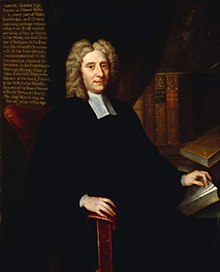This day in history: English philosopher and Anglican cleric Samuel Clarke was born on this day in 1675. He is considered the major British figure in philosophy between John Locke and George Berkeley.
Clarke's reputation rested largely on his effort to demonstrate the existence of God, and his theory of the foundation of rectitude. However, his reputation took a hit when he published _The Scripture Doctrine of the Trinity_ in 1712. After examining numerous passages in the Bible, he concluded, "There is one supreme cause… of all things [i.e. the Father]; one simple, uncompounded, undivided, intelligent agent, or person; who is the alone author of all being, and the fountain of all power...The Father alone, is, absolutely speaking, the God of the universe; the God of Abraham, Isaac and Jacob; the God of Israel; of Moses, of the Prophets and Apostles; and the God and Father of our Lord Jesus Christ."
This left no room for the Son to be almighty God. "The book caused a firestorm in Anglican circles as one of their own argued against the Trinity and endorsed what is most often described as an Arian view of God." ~Selling Science in the Age of Newton By Jeffrey R. Wigelsworth [Arianism was an influential "heresy" denying the divinity of Christ, originating with the Alexandrian priest Arius ( c. 250– c. 336). Arianism maintained that the Son of God was created by the Father and was therefore neither coeternal with the Father, nor consubstantial.] He shared these views with two associates of his, William Whiston and Isaac Newton.
Clarke wrote of the time of the Nicene Creed, "But in process of time, as men grew less pious, and more contentious, so in the several churches they enlarged their creeds and confessions of faith, and grew more minute, in determining unnecessary controversies, and made more and more things explicitly necessary to be understood, and (under pretense of explaining authoritatively) imposed things much harder to be understood than scripture itself, and became more uncharitable in their censures, and the farther they departed from the fountain of catholic unity, the apostolical form of sound words, the more uncertain and unintelligible their definition grew, and good men found nowhere to rest the sole of their foot, but in having recourse to the original words of Christ himself and of the Spirit of truth, in which the wisdom of God has thought fit to express itself." Source
Buy: And the Word was a god: A New Book on the Most Disputed Text in the New Testament - John 1:1 and The Dark History of the Trinity, is now available on Amazon by clicking here...and both are only 99 cents
This book, "The Impersonality of the Holy Spirit by John Marsom" is available on Amazon for only 99 cents. See a local listing for it here; Buy The Absurdity of the Trinity on Amazon for only 99 cents by clicking here - see a local listing for this here




